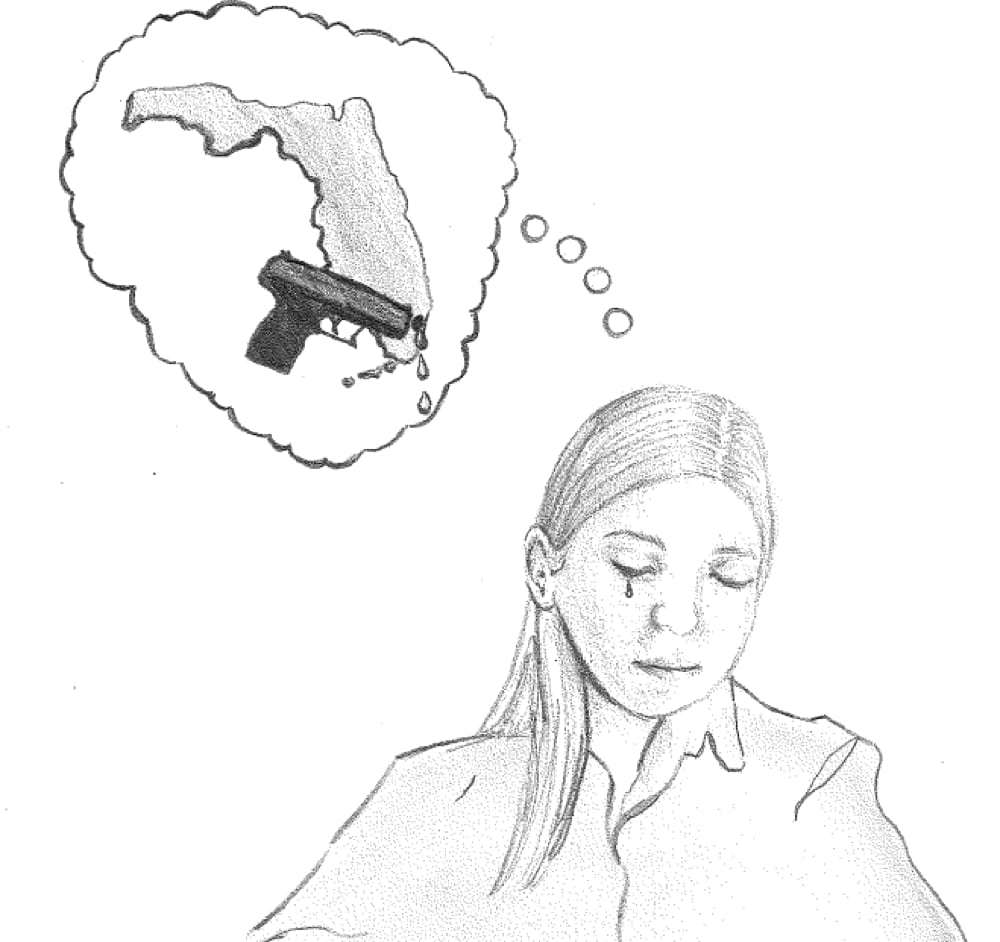If I were to die in a mass shooting tomorrow, I’d want you to politicize my death to no end. I’d want you to remember that my life was cut short at 19. I want you to remember that I hoped to work for the State Department, that I wanted to own a golden retriever and that I have a little sister who will now grow up without her big brother. I’d want you to shove the photograph of my lifeless face, my bullet-riddled body, my blood-stained clothes into the face of the politicians who have failed America’s children. The only way you would disrespect me is if you forgot about me.
This is my death note. I came up with it while casually sitting in class, contemplating what I would do if a crazed gunman decided to shoot up Occidental. This isn’t an abnormal thought for me, nor for any child that’s grown up after Columbine — a generation defined by constant mass shootings.
The Parkland students’ Snapchats and live tweets capture not only many students’ reality, but the imagery unwillingly internalized by every child in America. Scholars, journalists and politicians underestimate how often today’s kids think about gun violence. In today’s America, we have fifth graders telling their moms they’d rather die in a mass shooting than be the lone survivor and students planning how they’d save their wheelchair-bound teacher from a gunman. Yet only one article that I found ponders whether the kids at Marjory Stoneman Douglas “had perhaps visualized [a mass shooting] in their head once or twice before.”
I can all but guarantee you that the kids at Stoneman Douglas had — long before the massacre Feb. 14 — visualized a mass shooting in their head once or twice every day. Nine out of 10 public schools now practice active shooter drills; the Parkland students were mentally prepared. According to survivor David Hogg, students even began discussing their political plan of action while hiding from the gunman. That plan was to shout, march and debate their way on to the national stage, breathing life into our nation’s repetitive gun control narrative in a way not seen in the past. In the process, the Parkland students inspired youth nationwide to political action — youth who have spent their entire lives in the shadow of mass shootings.
Yet in the past two weeks, we have seen a concerted effort from the pro-gun crowd to censor and discredit the survivors of Parkland. Donald Trump Jr. liked a tweet insinuating that outspoken survivor David Hogg may be a crisis actor. Ex-GOP representative Jack Kingston remarked that left-wing groups are the ones actually directing the students’ action. And commentator Dinesh D’Souza — going beyond criticism into condescension — sneered that the Florida legislature’s decision to vote down a weapons ban was the worst news the teenagers had received “since their parents told them to get summer jobs.”
Apparently, we as young people not only have to (disproportionately) experience gun violence, we have to justify why we even deserve to have an opinion on it.
In that case, let me spell it out for you:
When 13 students are murdered in the library of Columbine High School, you might be able to forget about it. We’ve lived with its legacy for our whole lives. We learn that our country has been ignoring the slaughter of its children since before we could even walk.
When 20 kids and six teachers exit an elementary school in Connecticut in body-bags, you might be able to forget about it. We can’t. We learn that we are not safe even within sanctuaries of learning.
When this continues to happen, year after year, you might be able to forget about it. We can’t. We learn that the adults we trusted aren’t protecting us, and we decide that we will have to be the ones to push the agenda if we want anything to be accomplished.
And now we’ve grown up. By this year’s midterms, all Americans born in the same year as Columbine will be eligible to vote. As Lorraine Ali writes in the Los Angeles Times put it, we are witnessing “a changing of the guard” — surprisingly, our generation prefers to not die while doing their math homework.
It’s ironic that the ones supporting a president who celebrates political ignorance are also the ones branding the Parkland activists as uninformed. As the first digital natives, we read, watch and process more media related to gun violence in a day than most Americans have in their lifetime. We are the same generation that raised $41.8 million to fight ALS by dumping ice on our heads on Instagram. What makes anyone think we wouldn’t harness social media to fight gun violence?
When it comes to gun violence, we are children in name only. We imagine the deaths of our family and friends on a daily basis. We hope that a mass shooting at our school would lead to change. And we dream about what we would do if given the chance to implement that change in this country — a dream the Stoneman Douglas students are realizing.
To those who doubt the capabilities, the determination or the sincerity of the Parkland survivors, Stoneman Douglas student Emma Gonzalez has a few words for you:
“We call B.S.”
Zach Goodwin is an undeclared first year. He can be reached at zgoodwin@oxy.edu.
![]()































